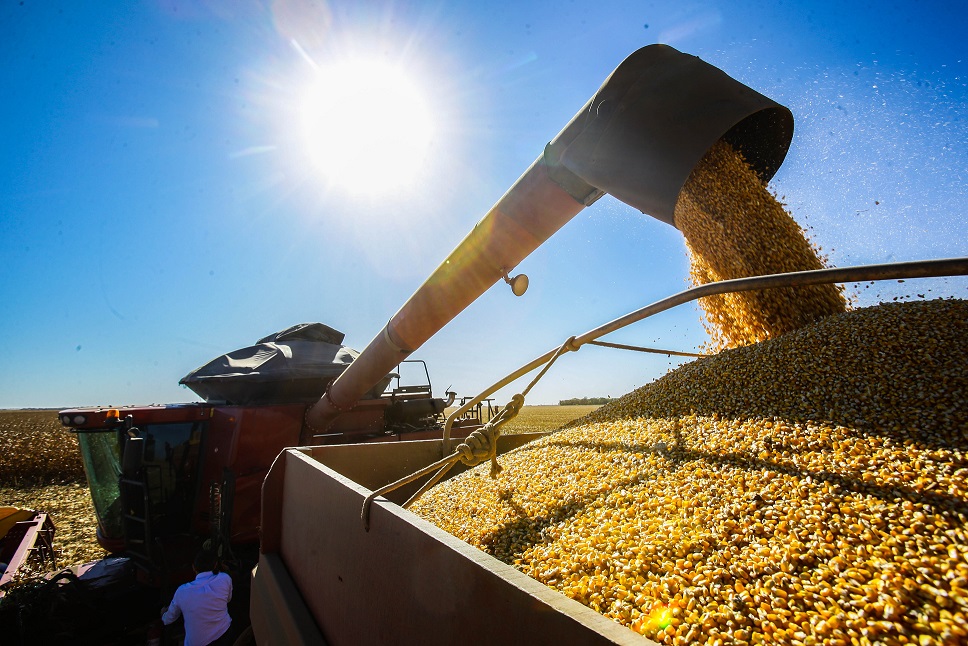Agribusiness
Expectation is for a production of 293.6 million tons next year in the projection for grains, cereals, legumes and oilseeds
By Jovem Pan 12/12/2022 08:20 am
GABRIELA BILÓ/STADÃO CONTENT/
Colheitadeira harvests corn on a plantation in the municipality of Sorriso, in the north of the state of Mato Grosso.
Colheitadeira harvests corn on a plantation in the municipality of Sorriso, in the north of the state of Mato Grosso.
Despite the adversities caused by the drought, the pandemic, the dollar price, the war in Ukraine and the increase in the value of inputs, Brazilian agribusiness has remained resilient and expects a record harvest next year. The Brazilian Institute of Geography and Statistics (IBGE) forecasts a harvest of 293.6 million tons for 2023, which represents an increase of 11.8% over 2022 in the projection for grains, cereals, legumes and oilseeds. In an interview with Jovem Pan News, the businesswoman of the sector, Carol Curimbaba, analyzed the context of national production: “Despite all this, we know how hard it is to undertake in the field here in Brazil, anywhere in the world, but in the Brazil gene knows how difficult it is. Even so, it will be a good year, with many adversities, but a good year for agribusiness. And an even better expectation for 2023”. It is worth mentioning that, in 2022, food inflation reached the table of Brazilians and boosted the IPCA alongside fuel.
overlay-cleverCloseClose
“We believe that prices will remain relatively high, due to the global crisis that is coming strong. The big countries that haven't seen inflation for decades, the United States and Europe, are seeing strong inflation. We can see this last year and we believe that it will remain. Interest rates will remain high, the dollar also with some volatility. The war is not showing much sign of ending. In such an uncertain world, Brazil managed to hold its own. It was a task force of the public and the private together holding the ends, especially the productive sector and the agribusiness sector”, analyzed Curimbaba.
The impact of negative variants was felt by many producers who have difficulties keeping their crops in the field, as explained by economist and professor at Mackenzie, Hugo Garbe: “When we talk about agribusiness in Brazil, we have big players, but the credit for agribusiness is still very complicated in Brazil. I see that the financial market, even in 2022, did not fully understand how Brazilian agribusiness works. Entering the day to day of these rural producers, credit with a harvest term, that is, the citizen plants corn and he has to have a credit that accompanies his harvest term, which is nine months to a year. A short time ago, we started to have this type of credit in Brazil, which definitely serves rural producers. A lot of people went through a tight spot and are still suffering consequences or broke”.
Regarding the unfavorable environment in the United States and Europe, in 2023, Garbe highlights the impact in Brazil: “In an economic crisis in Europe, the United States or anywhere in the world, families, who are the final consumers, will stop consuming consumer goods. That is, refrigerator, car and the like. Not agribusiness. That is, food, in general, is the last item to be replaced by families. Unless we have a very deep crisis in global terms, which is not likely. It is likely that we will have a recession in the United States and Europe as well, but nothing too deep”.
.

 Mr. Alessandro Jacob speaking about Brazilian Law on "International Bar Association" conference
Mr. Alessandro Jacob speaking about Brazilian Law on "International Bar Association" conference